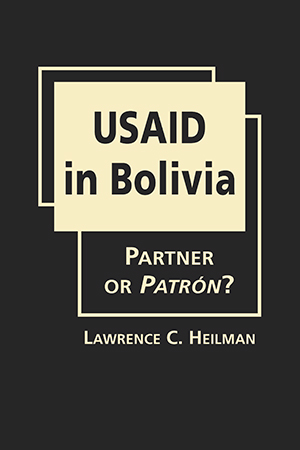
- 2017/346 pages
- A FirstForumPress Book
USAID in Bolivia:
Partner or Patrón?
Hardcover: $85.00
ISBN: 978-1-62637-436-2
Ebook: $85.00
ISBN: 978-1-62637-694-6
After Bolivia had received more than $4.7 billion from the US government to support 70 years of development efforts, why would Evo Morales abruptly expel USAID from the country in May 2013? The answer, alleges Lawrence Heilman, is rooted in a complex slice of history beginning with US assistance to Bolivia during World War II.
Heilman explores that history from the perspectives of both the US and Bolivia, presenting a tapestry of mutual benefits and conflicting interests. He appraises the ideas and personalities that determined US foreign aid policies/programs across successive administrations ranging from Franklin D. Roosevelt to Barack Obama; the political and economic context that shaped Bolivia's development aspirations; and the goals/strategies of the AID mission in Bolivia that guided its decisions about specific projects. The result is an in-depth picture of USAID in one country, but also important insights into US aid policy overall.
Heilman explores that history from the perspectives of both the US and Bolivia, presenting a tapestry of mutual benefits and conflicting interests. He appraises the ideas and personalities that determined US foreign aid policies/programs across successive administrations ranging from Franklin D. Roosevelt to Barack Obama; the political and economic context that shaped Bolivia's development aspirations; and the goals/strategies of the AID mission in Bolivia that guided its decisions about specific projects. The result is an in-depth picture of USAID in one country, but also important insights into US aid policy overall.





